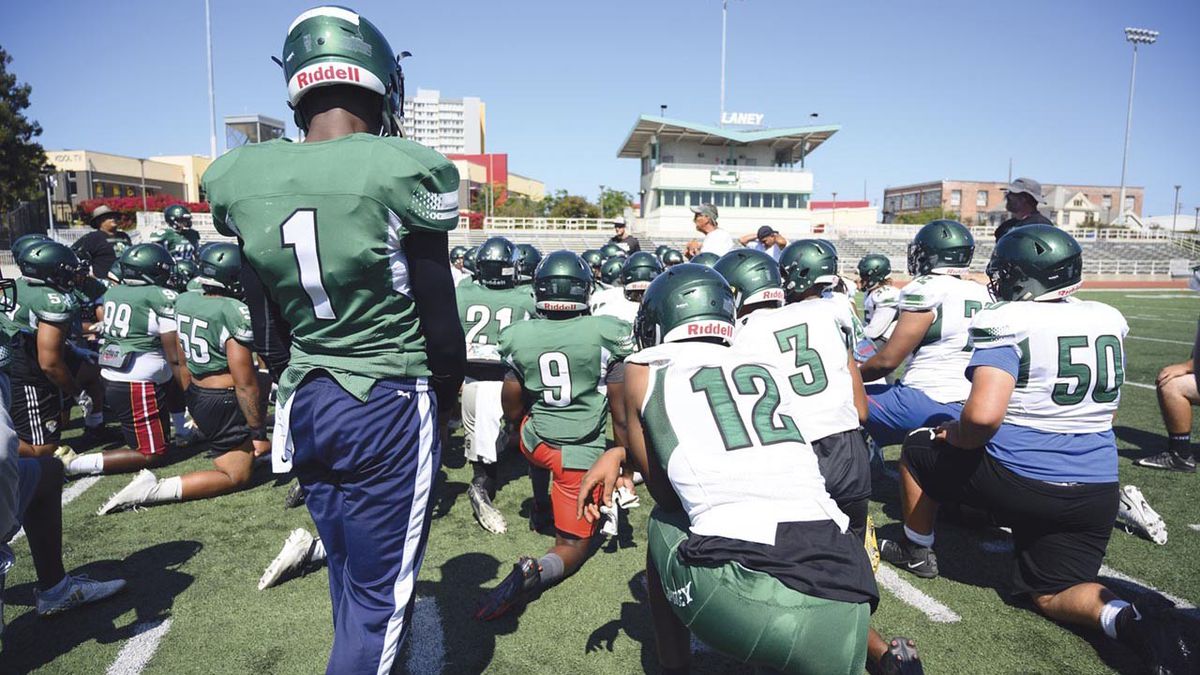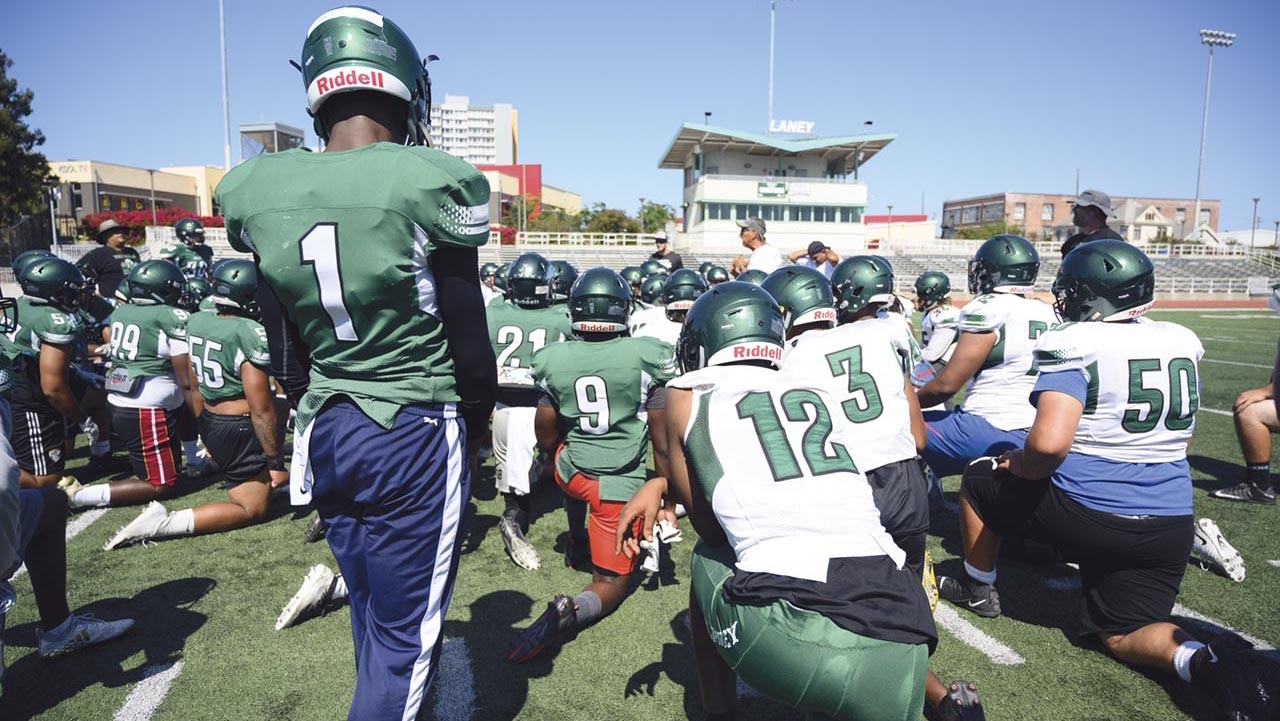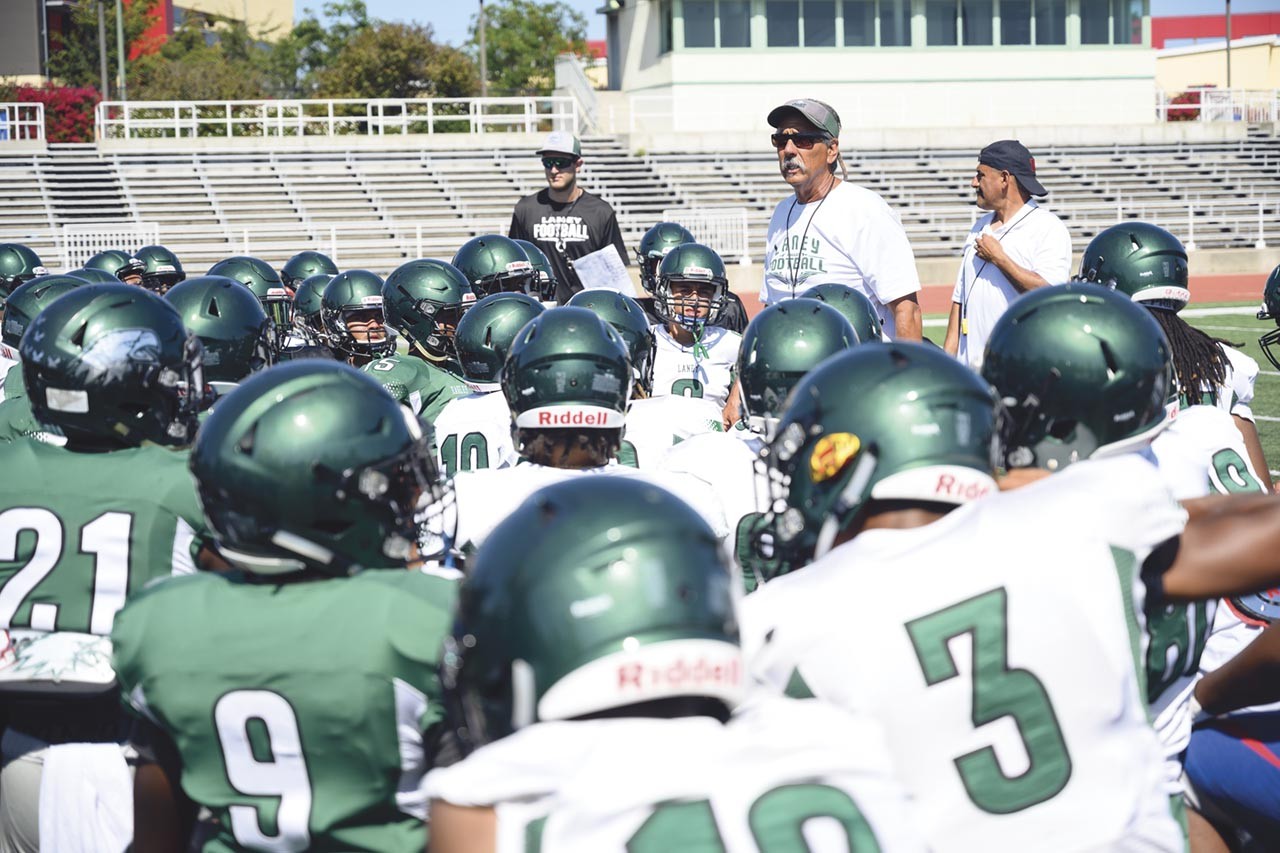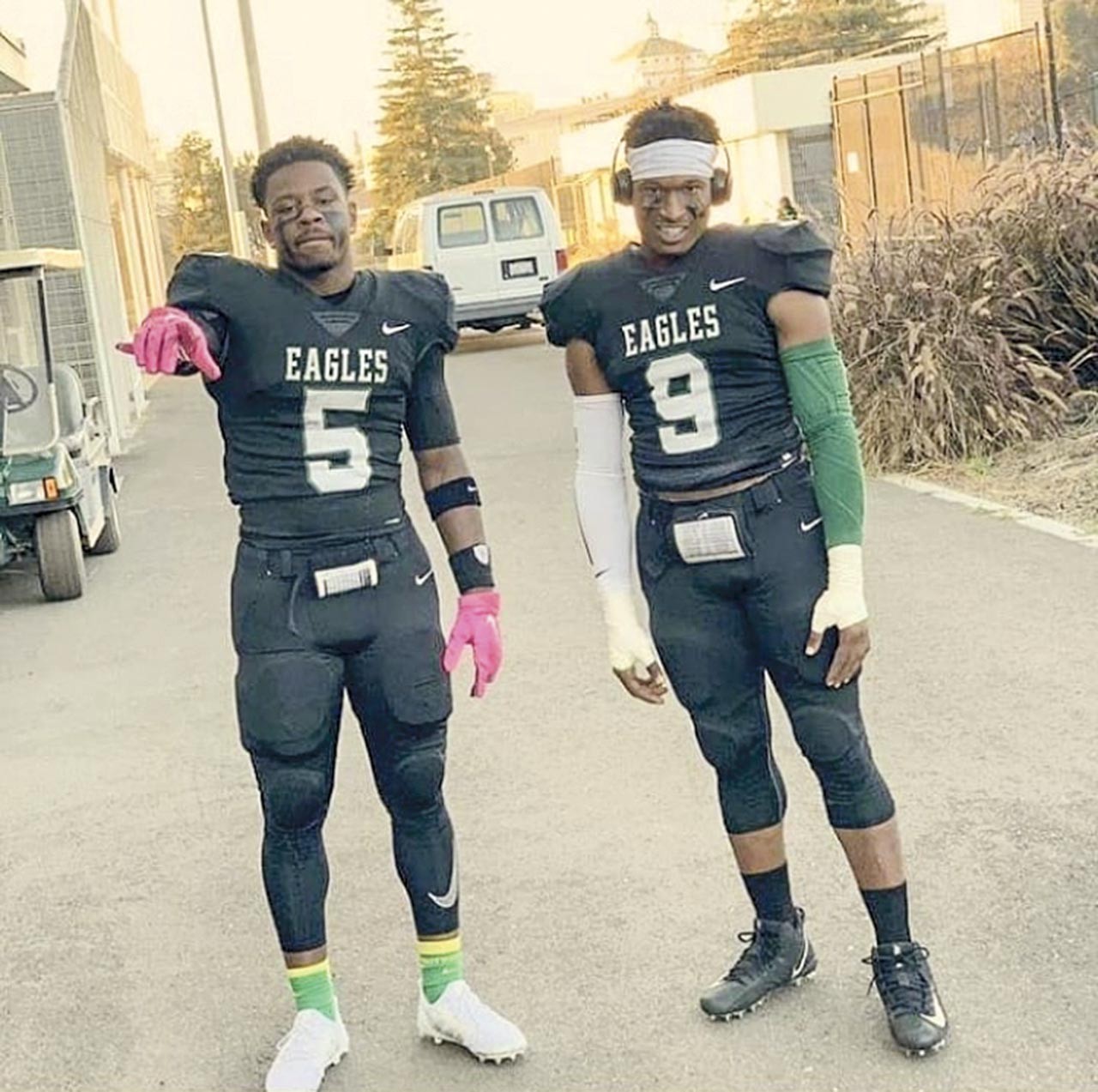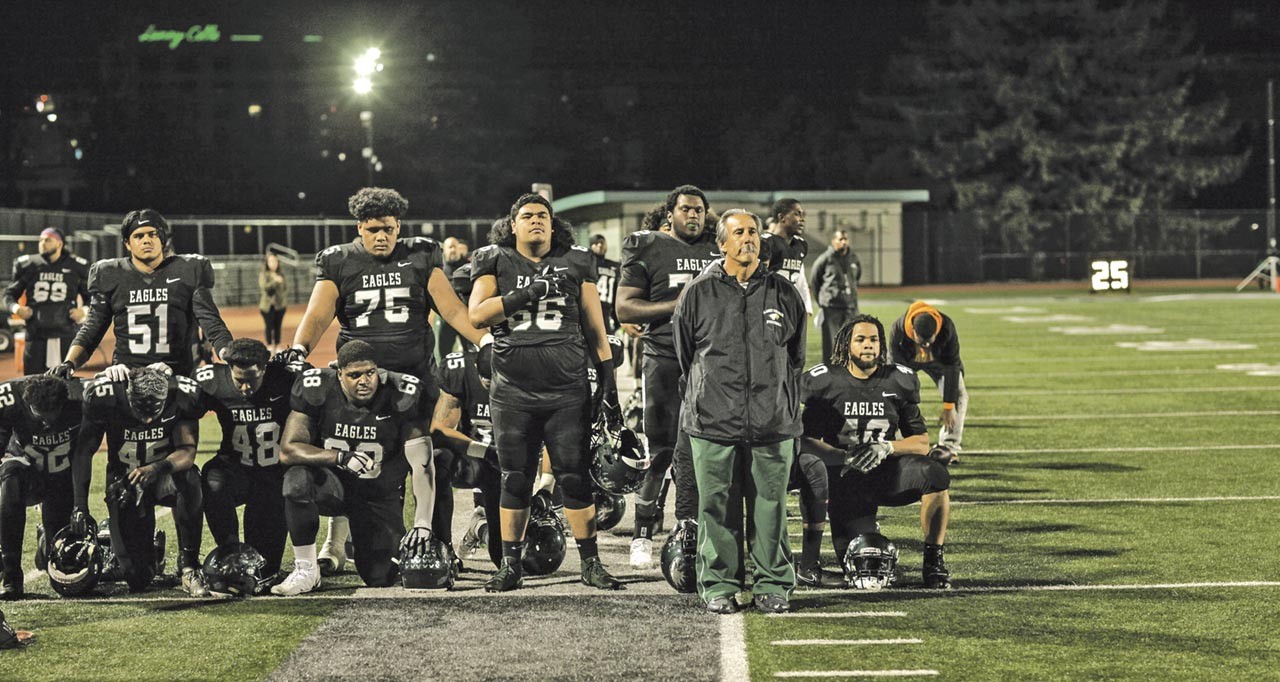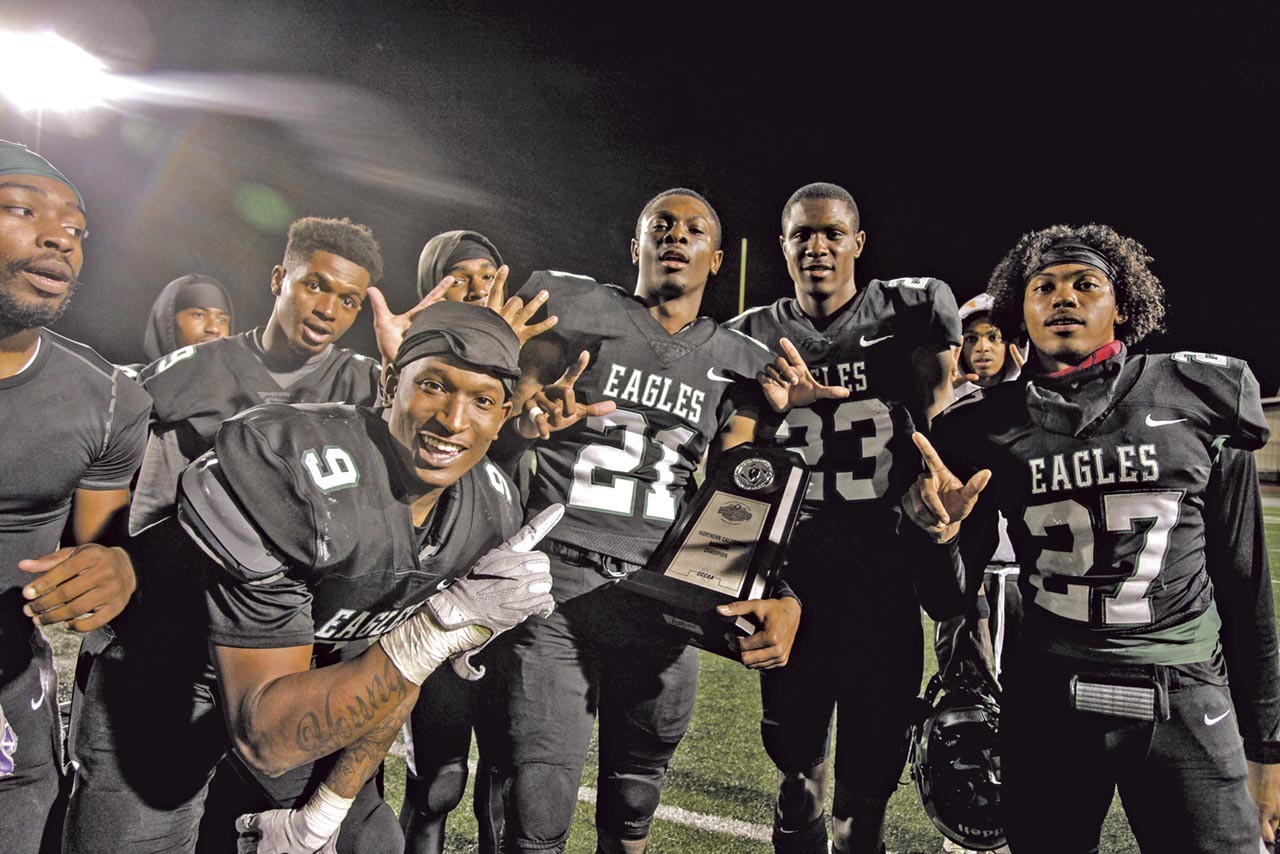There are two archetypes of players who end up on junior college football teams: stars who screwed up or were slapped down by life, and players who refused to believe the Division I college football recruiters who said they weren’t big enough, fast enough — good enough.
What most of them have in common is NFL dreams. Junior college is their last best chance to get a degree and maybe later a contract.

The 2019 Laney College Eagles football team at a recent practice. Credits: Photo by Lance Yamamoto 
Coach John Beam, above, dubbed Cameron Nathan, 5, and Armani Turner-Jenkins, 9, “the pitbulls.” Credits: Photo by Lance Yamamoto 
Cameron Nathan, 5, and Armani Turner-Jenkins, 9, “the pitbulls.” Credits: Photo by Lance Yamamoto 
Coach John Beam’s 2018 team was slow to build camaraderie, but eventually became a cohesive unit. Credits: Photo courtesy of Laney Athletics 
The 2018 state champion Laney Eagles football team. Credits: Photo courtesy of Laney Athletics
It’s a grind. You won’t get an athletic scholarship to play. If you’re like most of your teammates, you’ll be working part time and maybe living at home to make ends meet. In all likelihood, nobody shows up to your games. Nobody knows who you are. If you make it out, being a #JucoProduct will stay with you as a chip on your shoulder. No matter how much you win, you’ll always be the underdog.
All of this makes for great reality television. The stakes are high and the drama is thick. That explains the popularity of Netflix’s Last Chance U, a series that documents the triumphs and defeats of junior college football season by season.
Last month, the series’ producers announced that Laney College in Oakland will be the subject of the show’s fifth season, which debuts next summer. Throughout the fall, cameramen will follow the 50 or so young men who make up the Laney squad and their coaches wherever they go. Win or lose, it’s a huge opportunity for the players and the program.
When Netflix announced it had chosen Laney, assistant defensive coach Adam Kadourhe was as excited as anyone.
“But I’ll never forget how special last year’s squad was,” he tweeted. “Only a few REALLY know how much adversity we had to go through. Legends forever. #LaneyBuilt.”
If it weren’t for what happened last fall, Kadhourhe knew, the cameras would have never arrived.
In four decades of coaching football, Laney head coach John Beam had seen a lot. He’d watched his players get married, have kids, win NCAA titles and Super Bowls. Once, while head coach at Oakland’s Skyline High School, he remembers breaking up a fist fight and extinguishing a flaming porta potty that someone had set on fire, all before the team had even boarded the bus. He’d celebrated and grieved with players. He’d also seen them buried.
But monitoring the amount of particulate matter choking the air — that was new. It was Friday, Nov. 9, 2018, and the most destructive wildfire in state history had started the day before. By the next morning, enough smoke from the Camp Fire had billowed up and drifted 160 miles southward that the air over Laney College’s Eagle Stadium was becoming unfit to breathe. It was threatening to cancel the team’s scheduled game against Chabot College.
Throughout the afternoon he checked the EPA’s air quality index, a crude all-encompassing measure of toxicity. The number hung in the 150s, which fell under the category of “unhealthy.”
“No one understands any of these numbers,” he thought to himself.
Then he received an email. The school’s vice president had consulted with a risk management officer and decided to cancel the game.
“Hold on,” Beam wrote back. “You can’t cancel it; I’m the one in charge!”
The vice president backed down.
Beam is fit and energetic at 60. His head and upper lip are both covered with hair. He’s worn the same wispy mustache forever, though in recent years it’s grown more grey than black. He’s impressively tan. He looks like he’d just as comfortable tangling with a swordfish off the coast of Mexico as pacing the sidelines of a junior college football field.
It was at Skyline that Beam became deeply embedded in the fabric of Oakland. “I’ve taught thousands of people, from the mayor’s office” — Libby Schaff was once Skyline’s head cheerleader — “all the way down to Oakland’s biggest drug dealers.”
In Beam’s two-plus decades of coaching there, the team won 15 Oakland Athletic League titles, 11 section championships, and a state championship. He came to Laney in 2004 as an assistant coach, and was named head coach eight years later.
It ultimately fell on Beam to decide whether the Eagles would play that Friday, despite the smoke. Laney was the favorite to win, but the stakes were high. A win would bring the team to 8-2 and secure a playoff berth, maybe even a home game. A loss would likely end its season. But all of that was moot if the team didn’t play. In the morning, Beam consulted with the team’s trainer, who seemed to think they could play. The team doctor disagreed.
As game time drew closer, nearby sensors detected lower levels of particulate matter in the air, so the Eagles went through their routine as if they were going to play. Music blared in headphones on the field and in the locker room.
The players told the coaches and the referees they wanted to play. If finishing the regular season meant hacking up wads of discolored gunk at some future date, that was a price they were willing to pay. The air quality held steady just long enough to begin the game, although it soon regressed to unhealthier levels. Sophomore defensive lineman Vei Tomasi remembers it smelling like the team’s laundry had been piled around a bonfire. “It reminded me of camping,” he recalled, “the smell of it.”
That night, Tomasi and the Eagles overwhelmed the visiting Gladiators by a score of 14-0.
After the game, All-conference linebacker Cameron Nathan shouted out about his unit’s performance on Twitter: “S/o to my dawgs on defense last night holding Chabot to only 75 yards.”
Laney’s defense had been the team’s anchor all season. Under the leadership of defensive coordinator Josh Ramos, the Eagles had been a top-five defensive unit in both of the last two seasons, and they were always near the top of any list when it came to sacks. That’s because the team thrived on tormenting the other teams’ quarterbacks.
For the last two seasons, Jordan Whittley had played an outsized role in sowing chaos. The Oakland native lined up next to Tomasi on the defensive line. Before Laney, Whittley had been a standout running back at Oakland’s Castlemont High. He accepted an offer to play at San Jose State, but never made it there because of academic issues. After reconstructive knee surgery his freshman year, Whittley gained significant weight, so he moved to the other side of the ball. Before long, he was a menace, retaining the agility and quickness that made him a standout runner while nonetheless carrying 320 pounds. It made him a highly coveted Division I prospect.
The new guy on the defensive line was freshman Ramone Sanders. He was built like an ox — the type of guy who didn’t need to spend as much time in the weight room because his muscles seemed to swell all by themselves. At Oakland’s McClymonds High School, he had won two consecutive state championships.
The defensive backfield was held down by cornerbacks Da’Meak Brandon and brothers Nahshon and Rejzhon Wright, both freshmen. Imani Moore played safety. Jahari Kay and Josh Bolding played on the outside of the team’s impressive linebacking corps.
The inside linebackers were Cameron Nathan and Armani Turner-Jenkins — or as Beam called them, the Pitbulls. They weren’t the biggest or fastest, but they were ferocious. As one Laney coach put it, “Cam and Armani have that mentality that they will run through a brick wall if they have to.” At critical moments in a game, when the defense needed a boost or a stop, Beam would announce on the sideline, “Unleash the pits.”
Together, ‘the Pits’ formed the heart of the defense. Off the field, Cam and Armani had become friends, even though they had arrived at Laney under different circumstances.
Cam’s family had moved to the East Bay from Tulsa, Oklahoma when he was eight, eventually settling in Antioch. Although Cam had liked football, he didn’t fully commit to it until his senior year at Antioch High. That’s when he emerged as one of the Bay Area’s better linebackers, seemingly out of nowhere. Finishing in the top three in sacks, forced fumbles, and tackles in the Bay Valley Athletic League, he earned all-league honors. But he hadn’t gotten any high-profile scholarship offers. If he’d been a few inches taller, a little bulkier, coaches would say, he could have gone anywhere.
He chose Laney because it was a shorter commute from Antioch than the Bay Area’s other best junior college football programs — City College of San Francisco and College of San Mateo. Plus, Laney’s linebackers had all graduated before his arrival, which meant he could compete right away for a starting role.
Armani didn’t celebrate his decision to go to junior college. After a dominant senior season at Berkeley High, he had expected to hear from four-year schools about scholarships. He received letters and phone calls, but nothing came of it. At one point, he remembers asking a school counselor about his options. The counselor’s response: “Why don’t you go to Laney?”
“I didn’t want to go to Laney,” Armani recalled. “But where did I end up?”
He had spent most of his childhood in Berkeley. As a kid, Armani treasured bike rides with his stepdad to the local flea market. Then there were the pick-up football games at San Pablo Park, where he earned the nickname “Hammerhead” because he was already delivering punishing hits. Back then, he’d fight you if you called him that. Now that he makes his way as a middle linebacker, Hammerhead is a compliment.
Things got more complicated as Armani grew up. His family moved to Richmond when he was in middle school. Suddenly, he wasn’t allowed to ride his bike or play in the street. He’d always loved being outdoors, so being inside felt like a prison. He resented his mother for all of it, and their relationship deteriorated. By high school, he’d left home for the first time.
Over the years, he moved in and out. Sometimes he’d stay with a cousin or friend. Other times it was easier to just sleep in his 2008 Kia Optima. Football was his constant.
When Cam and Armani arrived at Laney as freshmen in 2017, both had designs on starting. Before long, they were essential cogs of a stout Eagle defense. A pair of pitbulls.
But the start of the 2018 season was a hard time in Armani’s life. In June, just a few days after his twenty-first birthday, his car broke down. He got another one, but it also broke down. Over the past few years, the car had been a lifeline. On a given night, even if he didn’t know where he’d sleep or what he’d eat, he could at least get around. Now he was aimless, and reliant on others for rides. After practice most days, players congregated at the Laney Field House, an open two-story building with big windows that housed the team’s locker room and weight room. But once his teammates left in the evening, his sense of security would fall away. Sometimes he’d ride the Bay Trail all night on a scooter.
“When I was at practice I didn’t have to worry about anything, I was in the zone, having fun,” he recalled. “But soon as practice was over — fuck, here comes the real world, bruh.”
Sometimes Cam kept Armani company on those after-practice excursions. They’d go to the 24-hour Colonial Donuts on Lakeshore Drive, eat, watch people, and laugh.
When Armani got down about housing or worried about his next meal, Cam reminded him about the list. During their freshman season, the two had listed dream schools they were playing to get scholarships to — powerhouses like Oregon and ‘Bama. Then, after a stint at a four-year school, they’d see each other at the NFL Combine.
“No matter what happens, I need you to meet me at that draft table in two years,” Cam would say.
The week after the smoke-choked game against Chabot, Beam arranged for the Eagles’ first playoff game to be moved from Laney to Cabrillo College in Aptos, where the air was clearer. There, the Eagles would face off against College of San Mateo, the team that had handed them their most searing regular-season defeat.
The game had been brutal. The reason was turnovers — five to be precise — the worst of which was a fumble at the one-yard-line that a Bulldog returned 99 yards for a score. Then there were their 200 or so yards of penalties. All said, despite limiting their opponent to a measly 137 yards of total offense, they lost 27-18.
The team had grown so mournful after its two regular-season losses that Beam worried it would derail a potentially historic season. “To be honest, I didn’t know if we’d survive,” he said. “That’s the hardest thing with this group: So much of their life, shit happens that can’t be overcome. I tell them, ‘Look, you’re always going to have roadblocks in your life. If you fall down, do you stay down or get back up?'”
Earlier that season, Beam himself wasn’t so sure of the answer. The challenges began that summer, when fights broke out at practice nearly every day. Eventually, Beam called Cam and other returning players into his office. “We’re gonna stink,” he told them, “because all you guys do is fight.” Beam was a broken record: “Only Laney can beat Laney.”
But as the season went along, the team got better, both on and off the field. The offense, which once looked like the team’s biggest liability, was putting up points. Quarterback Jordan Brookshire, a transfer who had lost his starting job at Santa Rosa Junior College, could both run and throw. In the backfield, John McDonald, who had been running track the year before, emerged as the leader of a dynamic running attack. Speedster wide receivers Jared Smart and Angelo Garrett could break off a big play at any moment.
Then at practice, the team demonstrated a maturity that Beam hadn’t seen before. The players were serious. They did their homework. They made fewer mental mistakes, the kind that could cost them a game.
Just days before the Eagles’ rematch with San Mateo, a speed bump emerged. As Armani, who had lucked into a rent-free housing situation in a church-owned shack near the West Oakland BART station, later put it: “Every time we do something good, it seems like bad shit happens.”
It started with one player’s observation: “My phone’s gone!” The team had just finished a day of practice in the smoky air. As players filtered into the locker room, one player after another realized they’d been victimized. The thief had lifted 13, 14, maybe 15 cell phones. Wallets had been stolen, too.
After all the team had been through together — the odds, the smoke, the in-fighting — now the players stood facing a ransacked home locker room days before a rematch with the team that had beaten them so badly. It’s one thing to have your stuff stolen, especially if you don’t have the means to replace it. It’s another to suspect, as some did, that the thief could be in your midst. After all, why were some belongings gone and others left alone?
It didn’t make sense.
Cam remembers trying to calm down his teammates, who had begun saying things like, “If I don’t get reimbursed, I’m not playing.” As a leader in the locker room, he saw it as his duty to make sure his teammates didn’t fall apart. He tried to calm them down, but made little progress. “How could he relate?” they asked him. He hadn’t been robbed.
Kadourhe, the assistant defensive coach, sat down on a bench near the Field House that evening. The sun set in a cloud of black smoke as he thought to himself, “How could something like this happen right before the most important game of the season?”
It was a wrenching experience for the players, but over the next few days, they gradually recovered. In the days before they boarded the bus to Aptos, Cam began to float a half-serious conspiracy to his teammates: What if San Mateo had stolen players’ stuff to get in their heads? The subtext: Take it out on them.
Shortly after the team’s charter bus arrived at Cabrillo College, the chirping began. A fight nearly broke out on the field between Eagles and Bulldogs during pre-game warm ups. Laney was high on a mixture of anger at being robbed and a hunger for revenge.
Or maybe it was the other way around. San Mateo had its own grievance. The Bulldogs had beaten the Eagles during the regular season, but Laney was seeded higher in the playoffs due to a ranking system. Laney had therefore earned the home-field advantage, an advantage that was now moot, since the team had been chased from its home by the smoke. But for San Mateo, the residue of feeling snubbed remained.
Laney received the kickoff, and then marched down the field relying on the power and speed of running backs John McDonald and Harold Tidwell. The sophomore McDonald was a track star; the freshman Tidwell was a bruiser. After a long run by McDonald, the Eagles were in the red zone, on the verge of scoring. But a third down run left them just short of a first down. For the fourth down attempt, quarterback Jordan Brookshire settled behind his offensive line in the shotgun position. The snap was high, and Brookshire stabbed at it to no avail with his left arm. Within seconds, the Bulldogs defenders were there to recover the loose ball.
Minutes later, a series of personal fouls called on the Eagles — roughing the passer and taunting — allowed the Bulldogs to march into scoring position. With just under five minutes left in the first quarter, it was déjà vu. Turnovers and penalties might end up beating Laney once again.
But the Bulldogs failed to convert their strong field position into points, and in the second quarter the Eagles got back on track. On offense, Brookshire found a groove. He scored on a quarterback keeper from the one-yard-line, then threw a touchdown pass to wide open Angelo Garrett. At the half, Laney was up 14-0.
Both sides kept racking up penalties. Early in the fourth quarter, the bickering between the two teams reached a head. When the referees called back a long Bulldogs gain on a fake punt attempt, Laney’s players celebrated the call on the field. Cam was penalized for unsportsmanlike conduct and ejected from the game. San Mateo head coach Tim Tulloch, who was screaming at the officiating crew, also was penalized. The incident nearly catalyzed a brawl. Players on both teams kneeled to soothe the tension.
“This extracurricular stuff is getting ridiculous,” commented Steve Nicolopulos, a former San Mateo coach, on the game’s broadcast.
As the final seconds of the game wound down, it was clear that the contest had been more of a fracas than anything else. Helmets, penalty flags and obscenities had flown in every direction. Every class of personal foul had been called. When the whistle blew, the score was still Eagles 14-Bulldogs 0. The game had been ugly, but a win was a win.
Practice was miserable the following week. Nearly two weeks after the start of the Camp Fire, the smoke had only grown thicker. The coaches encouraged players to take it easy at practice. That Saturday, a few days after Thanksgiving, the Eagles would play at home against Fresno City College. The Rams had upset Butte, one of the best teams in the state, the same night that Laney had vanquished San Mateo.
During a walk through one day, Armani suddenly felt light-headed and called for a sub. It wasn’t anything serious, but the smoke made everything hard. His replacement blitzed the wrong gap and ran into Ramone Sanders, who fell to the ground. The hit looked harmless, but Ramone stayed down on the turf.
“Bruh, get your soft ass up,” Armani remembered thinking from the sideline. But Ramone didn’t get up. Instead, he lay there, screaming.
“What the fuck?” Armani thought.
It wasn’t until the second ambulance arrived and Ramone was on a gurney that Armani and everyone realized that Ramone had broken his leg. As the ambulance drove off, Armani remembered an interaction they’d had in the locker the prior week. Having seen Ramone rubbing his thigh and wincing about the pain, Armani encouraged his teammate to get it checked out. But then Ramone had his best game of the season. What did Armani know?
“What would have happened if I hadn’t subbed out?” Armani later found himself wondering. “Maybe he’d still be walking today.”
Even with Ramone in the hospital, the team went on to capture a major victory. On Thanksgiving weekend, the Eagles blew out Fresno City College 24-17 in Oakland. With Cam suspended due to his ejection from the San Mateo game, Armani stepped up and recorded 11 tackles, including a sack.
In the early morning after the game, freshman cornerback Rejzohn Wright logged onto Twitter to share his thoughts about winning the NorCal Championship:
“@Ray2wright: I remember coaches told me to not go to Laney because I wouldn’t get the proper coaching and our team wouldn’t get me seen … Well look at us now, the best program in Northern California. STATE HERE WE COME.”
The Eagles would have two full weeks to prepare for the state championship. But they weren’t ready for the news about Ramone, who hadn’t just broken his femur. Additional testing revealed that he had bone cancer.
Jahari Kay, who had known Ramone since elementary school, remembers football feeling small after hearing the news. “Forget the football, this is his life,” Kay said. “It could happen to anyone.”
It was something most of them reflected on over the next two weeks. Ramone was positive when teammates and coaches visited him in the hospital. He had just become a father earlier in the season. Now he had a potentially fatal diagnosis, but he kept smiling. It lent perspective to the struggles the other players were going through. Whether it was housing insecurity, caring for a young child, long commutes from the Central Valley, or working the night shift after a game — those struggles all seemed trivial next to cancer. On the eve of the state championship game, the stakes were clear. They wouldn’t just be playing for themselves, for the chance at a scholarship, for a ring. They also would be playing for Ramone.
By game day, Beam and his staff had watched hours of tape of their final opponent, Ventura College. In their minds, the Pirates’ biggest threat was Brandon Jordan. The 6-foot-6-inch wide receiver’s eight touchdown receptions led the Southern California Football Association. He was also one of the state’s better recruits at his position, fielding offers from both Fresno State and Louisville. But beyond Jordan, the Pirates looked beatable. If Laney could stop the Ventura running game and lock down Jordan, their chances of winning would be good.
By 8 a.m., Eagles players and coaches were already at the Laney Field House, packing their duffle bags for the hour and a half bus ride east to Hughes Stadium in Sacramento. There, the Eagles would face Ventura College for the right to call themselves state champions.
Hughes had a new video scoreboard and a new sound system, but it still felt like an old stadium. The sidelines were just a few yards from the field, and even though the 20,000-capacity stands were less than half full, it was loud. On the field, the players could hear everything.
In the locker room before the game, they sang along to the team’s chosen anthem, Meek Mill’s “Dreams and Nightmares”: “See my dreams unfold, nightmares come true. / It was time to marry the game and I said, ‘Yeah, I do.'”
Ramone joined the team on the sideline in a wheelchair.
The game began as well as Laney could have hoped. Less than three minutes in, Bulewa Byrd blocked a punt that gave Laney the ball inside the Ventura ten-yard-line. An Eagles touchdown followed. After a Ventura returner mishandled the ensuing kickoff, pinning the Pirates inside their own five-yard-line, Jordan Whittley tackled the Ventura running back in his own end zone for a safety. The ensuing punt gave Laney great field position. Another touchdown. After another defensive stand, Laney put the ball on the ground, grinding down the clock. With 3:26 left in the first quarter, Brookshire connected with wide receiver Angelo Garrett for a 13-yard touchdown. At the end of the quarter, Laney was ahead 23-0.
The lead had the team in good spirits, but players knew better than to take it for granted. Defensive coordinator Josh Ramos had the same feeling. “This is going to be a game,” Ramos said as he paced the sideline. The lead wouldn’t hold for long; the Ventura offense was simply too good. In the second quarter, the Pirates started lobbing the ball to Jordan. He hauled in two long touchdowns, cutting the Eagles’ lead to nine.
As the end of the half approached, the Eagles took the ball inside the Pirates’ 10-yard-line. After a dropped touchdown pass, Eagles kicker Isaak Parada nailed a wobbly line drive field goal from 29 yards out. Twelve-point lead, Laney.
Just minutes after the start of the second half, Pirates running back Thomas Duckett scored on a 32-yard touchdown run. The Pirates were a score away from the lead. With the defense on its heels, the Eagles’ offense needed to come through.
And come through it did. Brookshire fed McDonald handoff after handoff. The quarterback capped off the seven-minute, 75-yard drive by punching in his second rushing touchdown of the afternoon. The score was 33-21.
But it was only a matter of time before the Laney players’ real opponents showed up — themselves. Ventura was on its own 38-yard-line, when, under pressure, quarterback Brock Domann tossed the ball down the right sideline. Instead of reaching the intended receiver, Laney cornerback Da’Meak Brandon came down with the ball. Interception. It was the momentum shift Laney needed. There was only one problem: The play was called back. Cam, who had been peppering Domann with hits all afternoon, was called for roughing the passer. It was a fifteen-yard penalty and automatic first down for Ventura.
On the very next play, Armani stuffed the Ventura running back in his own backfield. But as he got up, he ostentatiously strode over and stared down the other player. A flag came out immediately — unsportsmanlike conduct. Another fifteen yards, another first down. In just two plays, the Eagles had let Ventura move the ball from deep in its own territory to scoring position, all without recording positive yards on a play.
Then Domann lobbed yet another pass in Jordan’s direction for a touchdown, his third of the day. The Pirates were back within one score.
In the fourth quarter, the teams again traded touchdowns. Laney scored on a pass to Angelo Garrett. Ventura answered with a fourth touchdown pass. When Laney got the ball back, it would be its last offensive drive of the season.
With two minutes left, 10 more yards was the only thing standing between Laney and a championship. After that, they could run out the clock — kneel their way to victory. After three straight rushes, the Eagles fell three yards short of a first down. McDonald had carried the ball more than 30 times, and was limping in and out of the huddle. The team decided to go for it on fourth down. Brookshire handed the ball to McDonald, who was met in the backfield by the Ventura defense. This time he couldn’t wiggle out of trouble.
Now it was up to the Eagles defense. Domann came out firing. His plan was simple: get the ball to Brandon Jordan. With 35 seconds to go, Jordan caught a long pass to bring the Pirates into Laney territory. Nine seconds later, Jordan hauled in another one, this time at the 30-yard line. Suddenly the Pirates were in scoring position.
On third down and long, with 11 seconds remaining, the Pirates took a shot. As his receivers streamed down the field, Domann floated high and deep. As the game clock had ticked down, Jordan extended for the ball, but it was behind him. The pass was knocked away by Eagles corner Da’Meak Brandon.
Win or lose, it was now the last play of the season. With 30 yards to go, the Eagles were anticipating another pass to the end zone. Their hope was to force a bad pass from Domann, the Ventura quarterback. With the snap, Eagles linebackers Jahari Kay and Josh Bolding crashed toward the quarterback. Out of options, Domann tucked the ball and made a run for it. Seconds later, Cam, who had dropped back into pass coverage was still the nearest player, realized what was happening.
“If I don’t make this tackle, they win the game,” he thought to himself.
As Domann crossed the 20-yard line, Cam was right behind him. He was approaching from an angle, which meant he had to leap to make the tackle. As he lay his arms on Domann’s back, the quarterback was already falling to the ground. Three of Cam’s teammates were also there, bearing down on Domann, who had begun a slide, realizing that his path to the end zone — and the state championship — was blocked.
The field and the sideline erupted in cheers. Some Eagles ripped off their helmets and screamed. Others immediately ran toward the opposite end zone. Beam jumped into the arms of one of his assistants, still gripping a playbook. It wasn’t until later that some of the coaches realized why so many players had run to the opposite end zone. They went to celebrate with Ramone.
There was joy, but also vindication. They were champions, and no one could take that away from them. McDonald, the game’s MVP, made his feelings known on Twitter:
“I didn’t get all conference this year and that made me feel some type of way especially when I got Honorable mentions… coach told me make them regret it and now I’m a STATE CHAMP !! and was MVP with 217 yards rushing. All glory to God.”
The Wright brothers, who had commuted from Stockton all year, were thinking about their father, who had recently died. “Through all I been through…I didn’t give up a single touchdown in 2018 and I’m a California state championship … I love you Dad,” Rejzhon tweeted.
On the ride home to Oakland, the bus was a rolling party. The driver had a hard time seeing out the front window because it kept fogging over. The celebration raged on through the night.
As the next spring turned to summer, new faces started appearing in the Laney Field House. Incoming freshmen were in the weight room, getting a start on transforming their young bodies into college football shape. Returning players were on the field doing drills they hoped would prepare them for another transcendent season.
Meanwhile, recent alums were counting down the days till they left Oakland. Star lineman Jordan Whittley was on his way to Corvallis, Oregon on a full-ride scholarship to Oregon State. Vei Tomasi would soon be leaving for Moscow, Idaho, home of the University of Idaho. Brookshire and McDonald were going to San Diego State and Middle Tennessee, respectively.
The Pits had waited all spring for the offers to come. They didn’t hear from any of the schools on their list. Not from Oregon, not from ‘Bama. Maybe it had been an unrealistic goal from the start, but at the same time, what team wouldn’t want the best junior college inside linebacker duo in California, maybe the country?
On the bad days, Armani wondered whether or not going to Laney had been the right choice. He led the state in tackles and no one seemed to notice. Hell, the team won the whole damn thing and people in the area didn’t even seem to notice. “We need a parade or something,” he joked. “We still ain’t got no parade.”
But he remained upbeat. He got a few offers from smaller schools. Football would at least give him an education. For now, home will be Kentucky State, where he’ll play this fall and hope to disprove the doubters all over again. He says that someday, whether he makes the NFL or not, he’ll travel. He wants to see Dubai, Japan, France, Egypt. He dreams of buying a home. No more wondering where he’s going to sleep.
This summer, Cam settled on an offer from Missouri Southern, where he’ll play this fall. Even if it’s not the big-time, he has no regrets about going to Laney. “If I could do it again, I’d do it, just to get those memories,” he said.
When Ramone came to get his ring this summer, he was smiling, in good spirits. But Cam recalled feeling devastated that a guy who used to look like he could run through a brick wall looked so small. “He just had one of those bodies that was built for football,” Cam said. “It was tough to see that, it’s still tough. I done cried so many times.”
Still, when Beam saw Ramone at the Field House, he was struck by how upbeat he was about conquering his illness. If he hadn’t broken his leg, who knows how long his cancer would have gone undiagnosed? He even talked about getting back out on the field someday.
“It’s not the tragedy of Ramone Sanders, it’s the strength of Ramone Sanders,” Beam said. “His outlook on life hasn’t changed. If you could can that and give it to every kid, every human, Earth would be a much better place.”
For his part, Beam hopes the cameras this season won’t change him or his players. Over the last month, he’s been telling everyone that while the show might be called Last Chance U, Laney is more of a “Best Chance U.” Most of his players aren’t going to the NFL. But football is one way to get an affordable education, to change your life.
Last week, a new Eagles team boarded the bus to Sacramento City College. It was the same venue where they had beaten Ventura nine months earlier. But this time it was different. There were fewer fans, but more cameras. The weather was hot and tempers were cool. After all, it was just a preseason game. The real test would begin next week.
Help Ramone Sanders beat cancer: GoFundMe.com/f/help-an-oakland-studentathlete-fighting-cancer

